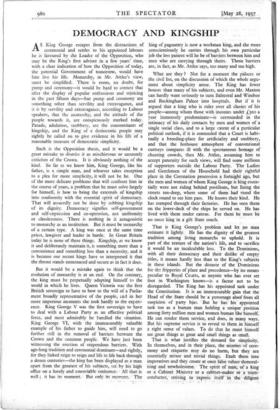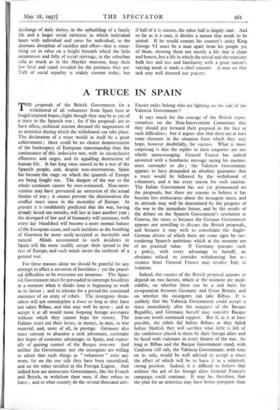DEMOCRACY AND KINGSHIP
AS George escapes from the distractions, of ceremonial and settles to his appointed labours he is favoured by the Leader of the Opposition, who may be the King's first adviser in a few years' time, • with a clear indication of how the Opposition of today, the potential Government of tomorrow, would have him live his life. Monarchy, in Mr. Attlee's view, must be simplified. There is room, no doubt, for pomp and ceremony—it would be hard to contest that after the display of popular enthusiasm and rejoicing in the past fifteen days—but pomp and ceremony are something. other than servility and extravagance, and it is by servility and extravagance, according to Labour speakers, that the monarchy, and the attitudc of the people towards it, are conspicuously marked today. Parade, adulation, snobbery, are the concomitants of kingship, and the King of a derfiocratic people may rightly be called on to give evidence in his life of a reasonable measure of democratic simplicity.
Such is the Opposition thesis, and it would be a great mistake to dismiss it as mischievous or unseemly criticism of the Crown. It is obviously nothing of the kind. So far as we know him, King George, like his father, is a simple man, and whoever takes exception to a plea for more simplicity, it will not be he. One of the more delicate problems that will confront him in the course of years, a problem that he must solve largely for himself, is how to bring the externals of kingship into conformity with the essential spirit of democracy. That will assuredly not be done by robbing kingship of its dignity. Democracy signifies self-government and self-expression and co-operation, not uniformity or classlessness. There is nothing in it antagonistic to monarchy as an institution. But it must be monarchy of a certain type. A king was once at the same time priest, lawgiver and leader in battle: In Great Britain today be is none of these things. Kingship, as we know it and deliberately maintain it, is something more than a convenience and something less than a necessity, and it is because our recent kings have so interpreted it that the throne stands unmenaced and secure as in fact it does.
But it would be a mistake again to think that the evolution of monarchy is at an end. On the -contrary, the king must be perpetually adapting himself to the world in which he lives. Queen Victoria was the first British sovereign to have to bow to the will of a Parlia- ment broadly representative of the people, and in her more imperious moments she took hardly to the experi- ence. King George V was the first sovereign to have to deal with a Labour Party as an effective political force, and most admirably he handled the situation. King George VI, with the immeasurably valuable example of his father to guide him, will need to go further still in the removal of barriers between the Crown and the common people. We have just been witnessing the erection of stupendous barriers. With age-long tradition and ceremonial dominant—and rightly, for they linked reign to reign and life to life back through a dozen centuries—the king has been displayed as a man apart from the greatest of his subjects, set -by• his high office on a lonely and unenviable eminence: - All that is well ; it has -its moment. • But only its moment, The king of pageantry is now a workman king, and the more conscientiously he carries through his PWil particular job the less patient will he be of barriers between him and men who are carrying through theirs. Those barriers are, in fact, as Mr. Attlee says, too many and to high.
What are they ? • Not for a moment the palaces or the civil list, on the discussion of which the whole argu- ment about simplicity arose. The King has fewer houses than many of his subjects, and even Mr. Maxton can hardly want seriously to turn Balmoral and Windsor and Buckingham Palace into hospitals. But if it is argued that a king who is ruler over all classes of his people—among whom those with incomes under Lsoo a year immensely predominate—is surrounded in the intimacy of his daily contacts by men and women of a single social class, and to a large extent of a particular political outlook, if it is contended that a Court is habi- tually a breeding-place for artificiality and snobbery, and that the hothouse atmosphere of conventional curtseys 'compares ill with the spontaneous homage of cheering crowds, then Mr. Attlee, assuming him to accept paternity for such views, will find some millions of supporters outside the Labour Party. The Ladies and Gentlemen of the Household had their rightful place in the Coronation procession a fortnight ago, but the men and women of whom King George is king essen- tially were not riding behind postilions, but lining the streets ten-deep, where some of them had stood the clock round to see him pass. He knows their kind. He has tramped through their factories. He has seen them on the lower-deck of the ships he served on. He has lived with them under canvas. For them he Must be no mere king in a gilt State coach.
That is King George's problem and let no man estimate it lightly. He has the dignity of the greatest tradition among living monarchs to uphold. It is part of the texture of the nation's life, and to sacrifice it would be an incalculable loss. To the Dominions, with all their democracy and their dislike of empty titles, it means hardly less than to the King's subjects in these islands. But the distaste of the Dominions for the fripperies of place and precedence—by no means - peculiar to Royal Courts, as -anyone who has ever set foot in Washington knows—is a factor not to be disregarded. The King has his appointed task under the Constitution. It is an immeasurable gain that -the Head of the State should be a personage aloof from all suspicion : of 'party bias-. - But he has- his appointed task too as a human man holding a unique pOsition among forty million men and women human like himself. He can render them service, and does, in many ways. But his supreme service is to reveal to* them in himself a right sense of values. To do that he must himself see great things as great and small things as srnall.
That is what justifies the demand for simplicity. In themselves, and in their place, the niceties of cere- mony and etiquette may do no harm, but they are essentially minor and trivial things. Exalt them into imperatives and they create at once false values -demoral- ising and unwholesome. The spirit of man, of-a king or 'a Cabinet Minister or a cabinet-maker ot • a trait= conductor,' striving to " express itself ' in the 'diligent discharge of daily duties, in .the_ upbUilding of a family life and a larger social existence in which individual bears with individual and cares for individual, in the alternate discipline of sacrifice and effort—that is some- - thing set in value on a height beneath which the little meannesses 'and folly of social strivings, in the suburban villa as much as in the Mayfair mansion, keep their low level and stand revealed for the pettiness they are. Talk of social equality is widely current today, but if half of it is sincere, the other half is largely cant. And so far as it is cant, it divides a nation that needs to be united. If he would cement his country's unity Xing George VI must be a man apart from his people yet of them, showing them not merely a life that is clean and honest, but a life in which the trivial and the transient bulk less and less and familiarity with a great nation's varying needs is made a chief concern. A man set that task may well demand our prayers.







































 Previous page
Previous page